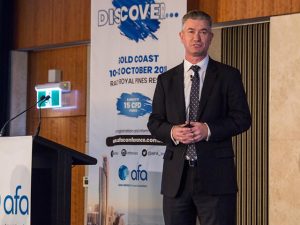The AFA held its annual National Practitioner Roadshow during July, visiting seven state capitals and presenting six speakers to attendees.
The theme of the roadshow – Unfold Your Next Step – was picked up by AFA Chief Executive, Phil Kewin, who pointed out that advice was going through a perfect storm of related issues, including proposed changes to education standards and codes of ethics, ASIC investigations, Parliamentary inquires and the ongoing Royal Commission into Banking and Financial Services.
Kewin said advisers not only had to navigate this storm for themselves but also for clients reminding attendees that Royal Commissions do take place and at present it was the wider financial advice sector which was under the microscope. This event, however, did not remove the need for good advice and for professional practitioners to deliver it.
AFA General Manager, Policy and Professionalism, Phil Anderson picked up on this idea and encouraged advisers to continue to believe in the value of what they do each day despite the difficult questions and issues raised by the Royal Commissions examination of financial advice.
Anderson said despite questions being raised around vertical integration there had been no widespread call for its removal while the calls for the complete end of grandfathered commission had been built on the incorrect assumption these funds would return to consumers instead of being retained by product providers.
On the issue of proposed professional and education standards, Anderson said the AFA was supportive of a move to new, higher minimum standard for advisers but remained concerned that FASEA has not consider professional development training, nor the impact the proposed standards would have on older advisers.
He added the proposed standards exceeded those outlined by the Federal Government and ignored the specialist nature of financial advice, particularly in the area of life insurance.
Taking a different approach, Netwealth Joint Managing Director, Matt Heine examined how friction in the financial advice process could be removed through the use of technology. Heine defined friction as any point in a consumer related process which slowed or impaired the delivery of service and highlighted how Amazon had removed friction in as many of its interactions as possible.
He said the elimination of friction in business and financial services was the new norm, and this includes financial advice. As such, advisers should re-examine their processes and documentation to remove any points which hindered their clients from receiving what they needed from their adviser.










